Unit 4 Space exploration Discovering Useful Structures课件(共17张PPT)-2025-2026学年人教版(2019)必修第三册
文档属性
| 名称 | Unit 4 Space exploration Discovering Useful Structures课件(共17张PPT)-2025-2026学年人教版(2019)必修第三册 |  | |
| 格式 | pptx | ||
| 文件大小 | 1.5MB | ||
| 资源类型 | 教案 | ||
| 版本资源 | 人教版(2019) | ||
| 科目 | 英语 | ||
| 更新时间 | 2025-06-21 19:15:28 | ||
图片预览


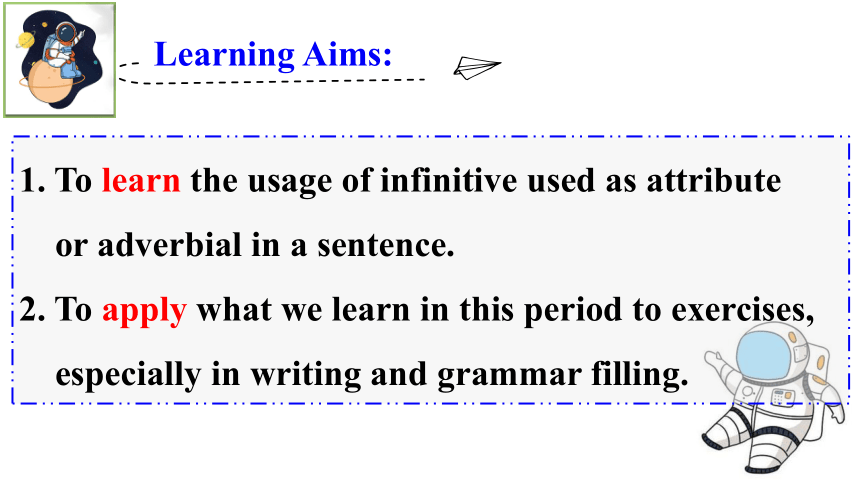
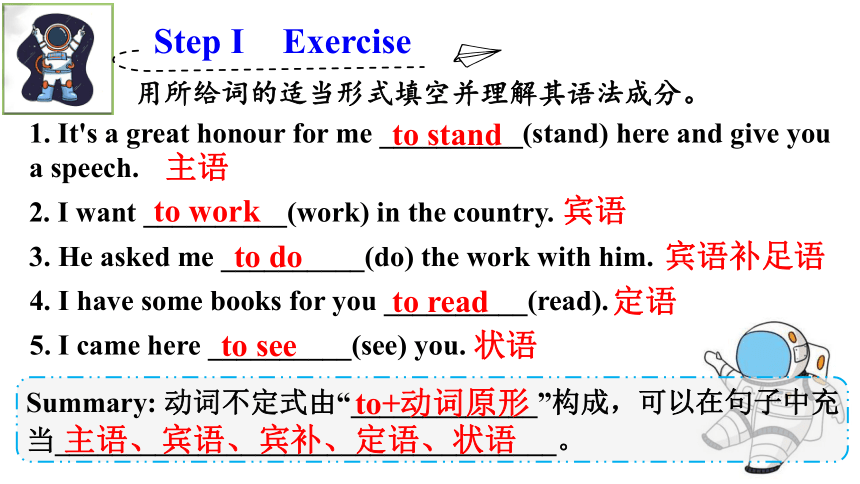
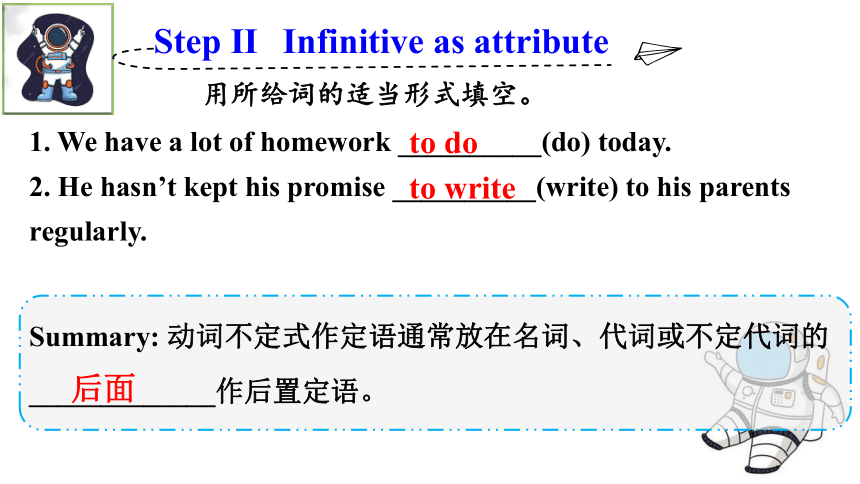
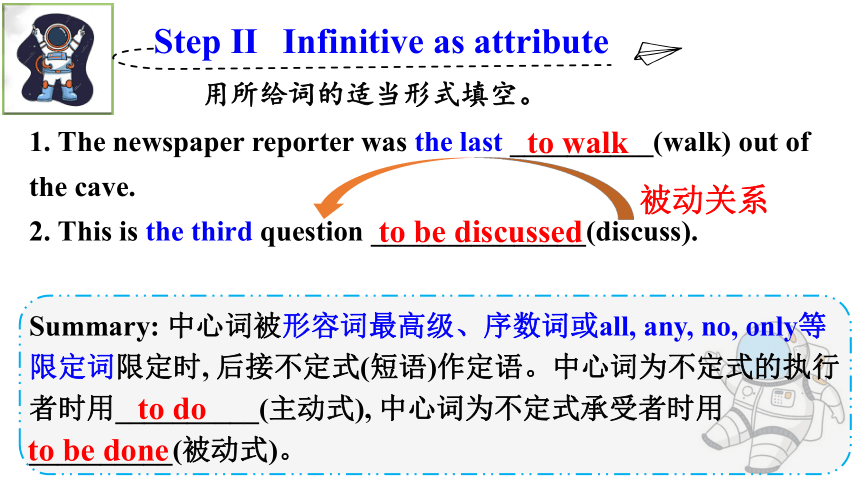
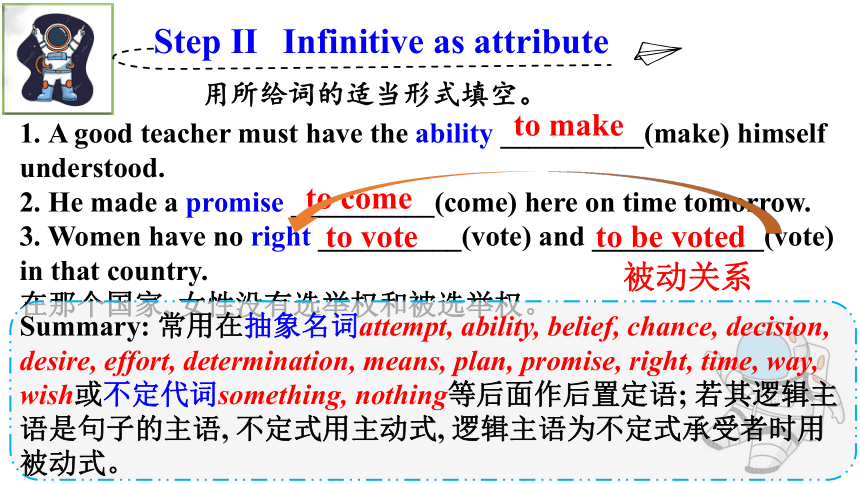
文档简介
(共17张PPT)
Unit 4
Space Exploration
Discovering
Useful
Structures
Mystery creates wonder and wonder is the basis of man's desire to understand.
---Neil Armstrong
神秘创造奇迹,而奇迹是人类渴望理解的基础。
Learning Aims:
1. To learn the usage of infinitive used as attribute
or adverbial in a sentence.
2. To apply what we learn in this period to exercises,
especially in writing and grammar filling.
Step I Exercise
用所给词的适当形式填空并理解其语法成分。
1. It's a great honour for me __________(stand) here and give you a speech.
to stand
主语
2. I want __________(work) in the country.
to work
宾语
3. He asked me __________(do) the work with him.
to do
宾语补足语
4. I have some books for you __________(read).
to read
定语
5. I came here __________(see) you.
to see
状语
Summary: 动词不定式由“_____________”构成,可以在句子中充当___________________________________。
to+动词原形
主语、宾语、宾补、定语、状语
Step II Infinitive as attribute
用所给词的适当形式填空。
1. We have a lot of homework __________(do) today.
2. He hasn’t kept his promise __________(write) to his parents regularly.
to do
to write
Summary: 动词不定式作定语通常放在名词、代词或不定代词的_____________作后置定语。
后面
Step II Infinitive as attribute
用所给词的适当形式填空。
1. The newspaper reporter was the last __________(walk) out of the cave.
2. This is the third question _______________(discuss).
to walk
被动关系
to be discussed
Summary: 中心词被形容词最高级、序数词或all, any, no, only等限定词限定时, 后接不定式(短语)作定语。中心词为不定式的执行者时用__________(主动式), 中心词为不定式承受者时用__________(被动式)。
to do
to be done
Step II Infinitive as attribute
用所给词的适当形式填空。
1. A good teacher must have the ability __________(make) himself understood.
2. He made a promise __________(come) here on time tomorrow.
3. Women have no right __________(vote) and ____________(vote) in that country.
在那个国家, 女性没有选举权和被选举权。
to make
to come
to vote
被动关系
to be voted
Summary: 常用在抽象名词attempt, ability, belief, chance, decision, desire, effort, determination, means, plan, promise, right, time, way, wish或不定代词something, nothing等后面作后置定语; 若其逻辑主语是句子的主语, 不定式用主动式, 逻辑主语为不定式承受者时用被动式。
Step II Infinitive as attribute
用所给词的适当形式填空。
1. Give me a pen __________(write) with.
2. There is nothing __________(worry) about.
3. He is looking for a room __________(live) in.
to write
to worry
to live
Summary: 作定语的动词不定式如果是不及物动词或者不定式所修饰的名词或代词是不定式动作的地点、工具等,不定式后面须有相应的介词。
Step II Infinitive as attribute
主动语态 被动语态
一般式 to do to be done
否定式 not to do not to be done
进行式 to be doing
完成式 to have done to have been done
完成进行式 to have been doing
动词不定式的时态和语态
Step III Exercise
①In many homes in the UK, the first person __________(wake) up has to make tea for the family.
②The airport ________________(complete) next year will help promote tourism in this area.
③The best way _____________(improve) your English is to join an English club.
④Carol was happy that she had the chance ______________(experience) the life in the city.
⑤These courses offer us opportunities ____________(improve) our abilities to appreciate art.
to wake
to be completed
to improve
to exoerience
to improve
用所给词的适当形式填空。
Step IV Infinitive as adverbial
用所给词的适当形式填空。
More TV programmes were produced __________(raise) people’s concern over food safety.
to raise
= _________________(raise) people’s concern over food safety, more TV programmes were produced.
In order to raise
= More TV programmes were produced so as __________(raise) people’s concern over food safety.
to raise
Summary: 不定式作目的状语,可用in order to/ so as to 代替, 有时为了突出强调目的, 还可将这个词组置于句首, 但so as to一般不用于句首。
Step IV Infinitive as adverbial
用所给词的适当形式填空。
1. He woke up __________(find) everybody gone.
2. He arrived at the train station, only __________(find) the train had already left.
3. She is too tired __________(do) the job.
4. He is old enough __________(go) to school.
5. Will you be so kind as __________(open) the window
to find
to find
to do
to go
to open
Summary: 不定式作结果状语, 表示出乎意料的结果; 有时也可用only to, too ... to, enough to, so ... as to 来表示结果状语。
Step IV Infinitive as adverbial
用所给词的适当形式填空。
1. I am so excited __________(be) here!
2. I am more than delighted __________(stay) with you!
3. She is proud ______________(win) the first place.
4. He is glad ______________(invite) to the meeting.
to be
to stay
to have won
to be invited
Summary: 不定式作原因状语, 常用于“主语 + be + adj. + to do”结构中, 此类形容词多是glad, excited, disappointed, shocked等表示喜怒哀乐的形容词。
Step V Exercise
单句语法填空
1. The next thing __________(do)is to keep the machine on for five minutes.
2. On Sundays, he always has a lot of letters __________(write).
3. You might think that with all these dangerous animals Australia is an unsafe place __________(live) in or visit.
4. The old man sat in front of the television every evening, happy __________(watch)anything that happened to be on.
5. I feel greatly honoured ____________(invite)to attend this party.
to do
to write
to live
to watch
to be invited
Step V Exercise
补全句子/一句多译
1. You should _____________________________________________.
你应该掌握解决复杂问题的能力。
2. The voluntary service __________________________________, including your own.
志愿服务给你一个改变生活的机会,包括(改变)你自己的生活。
3. He hurried to the railway station __________________________________.
他匆忙赶到火车站却被告知火车已经开走了。
4. He is ______________________________.
他到了参军的年龄了。
grasp the ability to solve complex problems
gives you a chance to change lives
only to be told the train had left
old enough to join the army
Step V Exercise
补全句子/一句多译
5. The girl is _____________________________________________.
那个女孩很懂礼貌, 她微笑着向那位老人打招呼。
6. It’s never _____________________________________________.
活到老学到老。
7. 许多农民给庄稼施肥, 为的是让庄稼长得更快些。
→Many farmers fertilize their crops _________________________ them grow more quickly.
→_____________________ them grow more quickly, many farmers fertilize their crops.
so polite as to greet the old man with a smile
too late to learn
in order to/so as to make
In order to make
Thank you!
Unit 4
Space Exploration
Discovering
Useful
Structures
Mystery creates wonder and wonder is the basis of man's desire to understand.
---Neil Armstrong
神秘创造奇迹,而奇迹是人类渴望理解的基础。
Learning Aims:
1. To learn the usage of infinitive used as attribute
or adverbial in a sentence.
2. To apply what we learn in this period to exercises,
especially in writing and grammar filling.
Step I Exercise
用所给词的适当形式填空并理解其语法成分。
1. It's a great honour for me __________(stand) here and give you a speech.
to stand
主语
2. I want __________(work) in the country.
to work
宾语
3. He asked me __________(do) the work with him.
to do
宾语补足语
4. I have some books for you __________(read).
to read
定语
5. I came here __________(see) you.
to see
状语
Summary: 动词不定式由“_____________”构成,可以在句子中充当___________________________________。
to+动词原形
主语、宾语、宾补、定语、状语
Step II Infinitive as attribute
用所给词的适当形式填空。
1. We have a lot of homework __________(do) today.
2. He hasn’t kept his promise __________(write) to his parents regularly.
to do
to write
Summary: 动词不定式作定语通常放在名词、代词或不定代词的_____________作后置定语。
后面
Step II Infinitive as attribute
用所给词的适当形式填空。
1. The newspaper reporter was the last __________(walk) out of the cave.
2. This is the third question _______________(discuss).
to walk
被动关系
to be discussed
Summary: 中心词被形容词最高级、序数词或all, any, no, only等限定词限定时, 后接不定式(短语)作定语。中心词为不定式的执行者时用__________(主动式), 中心词为不定式承受者时用__________(被动式)。
to do
to be done
Step II Infinitive as attribute
用所给词的适当形式填空。
1. A good teacher must have the ability __________(make) himself understood.
2. He made a promise __________(come) here on time tomorrow.
3. Women have no right __________(vote) and ____________(vote) in that country.
在那个国家, 女性没有选举权和被选举权。
to make
to come
to vote
被动关系
to be voted
Summary: 常用在抽象名词attempt, ability, belief, chance, decision, desire, effort, determination, means, plan, promise, right, time, way, wish或不定代词something, nothing等后面作后置定语; 若其逻辑主语是句子的主语, 不定式用主动式, 逻辑主语为不定式承受者时用被动式。
Step II Infinitive as attribute
用所给词的适当形式填空。
1. Give me a pen __________(write) with.
2. There is nothing __________(worry) about.
3. He is looking for a room __________(live) in.
to write
to worry
to live
Summary: 作定语的动词不定式如果是不及物动词或者不定式所修饰的名词或代词是不定式动作的地点、工具等,不定式后面须有相应的介词。
Step II Infinitive as attribute
主动语态 被动语态
一般式 to do to be done
否定式 not to do not to be done
进行式 to be doing
完成式 to have done to have been done
完成进行式 to have been doing
动词不定式的时态和语态
Step III Exercise
①In many homes in the UK, the first person __________(wake) up has to make tea for the family.
②The airport ________________(complete) next year will help promote tourism in this area.
③The best way _____________(improve) your English is to join an English club.
④Carol was happy that she had the chance ______________(experience) the life in the city.
⑤These courses offer us opportunities ____________(improve) our abilities to appreciate art.
to wake
to be completed
to improve
to exoerience
to improve
用所给词的适当形式填空。
Step IV Infinitive as adverbial
用所给词的适当形式填空。
More TV programmes were produced __________(raise) people’s concern over food safety.
to raise
= _________________(raise) people’s concern over food safety, more TV programmes were produced.
In order to raise
= More TV programmes were produced so as __________(raise) people’s concern over food safety.
to raise
Summary: 不定式作目的状语,可用in order to/ so as to 代替, 有时为了突出强调目的, 还可将这个词组置于句首, 但so as to一般不用于句首。
Step IV Infinitive as adverbial
用所给词的适当形式填空。
1. He woke up __________(find) everybody gone.
2. He arrived at the train station, only __________(find) the train had already left.
3. She is too tired __________(do) the job.
4. He is old enough __________(go) to school.
5. Will you be so kind as __________(open) the window
to find
to find
to do
to go
to open
Summary: 不定式作结果状语, 表示出乎意料的结果; 有时也可用only to, too ... to, enough to, so ... as to 来表示结果状语。
Step IV Infinitive as adverbial
用所给词的适当形式填空。
1. I am so excited __________(be) here!
2. I am more than delighted __________(stay) with you!
3. She is proud ______________(win) the first place.
4. He is glad ______________(invite) to the meeting.
to be
to stay
to have won
to be invited
Summary: 不定式作原因状语, 常用于“主语 + be + adj. + to do”结构中, 此类形容词多是glad, excited, disappointed, shocked等表示喜怒哀乐的形容词。
Step V Exercise
单句语法填空
1. The next thing __________(do)is to keep the machine on for five minutes.
2. On Sundays, he always has a lot of letters __________(write).
3. You might think that with all these dangerous animals Australia is an unsafe place __________(live) in or visit.
4. The old man sat in front of the television every evening, happy __________(watch)anything that happened to be on.
5. I feel greatly honoured ____________(invite)to attend this party.
to do
to write
to live
to watch
to be invited
Step V Exercise
补全句子/一句多译
1. You should _____________________________________________.
你应该掌握解决复杂问题的能力。
2. The voluntary service __________________________________, including your own.
志愿服务给你一个改变生活的机会,包括(改变)你自己的生活。
3. He hurried to the railway station __________________________________.
他匆忙赶到火车站却被告知火车已经开走了。
4. He is ______________________________.
他到了参军的年龄了。
grasp the ability to solve complex problems
gives you a chance to change lives
only to be told the train had left
old enough to join the army
Step V Exercise
补全句子/一句多译
5. The girl is _____________________________________________.
那个女孩很懂礼貌, 她微笑着向那位老人打招呼。
6. It’s never _____________________________________________.
活到老学到老。
7. 许多农民给庄稼施肥, 为的是让庄稼长得更快些。
→Many farmers fertilize their crops _________________________ them grow more quickly.
→_____________________ them grow more quickly, many farmers fertilize their crops.
so polite as to greet the old man with a smile
too late to learn
in order to/so as to make
In order to make
Thank you!
